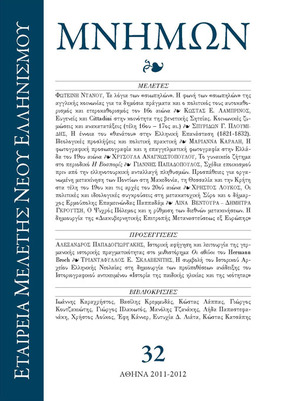Τροπές της «ρωσικής προσδοκίας» στα χρόνια του Μεγάλου Πέτρου
Part of : Μνήμων ; Vol.30, 2009, pages 37-60
Issue:
Pages:
37-60
Parallel Title:
Turns of the “Russian expectation” in the age of Peter the Great
Section Title:
Articles
Author:
Abstract:
While earlier Greek historiography tended to interpret the political orientation of the Greek world towards Russia in the Ottoman period only in termsof a premature stage of the Greek national movement, taking the nature ofexpectations invested in Russia for granted, current research, placing the phenomenon in the pre-national context of its age, enables the variety of imagesand representations of Russia in its relations to the Greek world to becomeevident. The present paper deals with the challenge that the reign of Peter theGreat (1689-1725) and his “Petrine Revolution” in Russia represented to theGreek world.The mental context, in which the “Russian expectation”, the notion of theRussian tsar as patron and liberator of the Eastern Church and the orthodox,was shaped in the circles of clerical scholars during the 17th century, was determined by the rich and still vivid tradition of byzantine political theology.Since the times of Peter the Great, elements echoing the secular principlesof the early enlightened absolutism are gradually inscribed on the dominanttraditional scheme of the pious orthodox tsar, heir to the Byzantine emperors.One is not confronted though with an unambiguous and stable picture. WhilePeter’s innovations were causing growing concern and puzzlement to the leadership of the Eastern Church, amongst the broader orthodox communities of theOttoman Empire the traditional representations of Russia, the tsar and his role remained intact. For the distinct group of those Greek scholars at the Russian court who were in various ways engaged in the Petrine reforms, the image ofRussia was closer to the self-perception of the Russian monarchy. Russia represented thus for them not just the great orthodox empire protecting the EasternChurch, but also an upcoming European power, whose reforming model couldbe useful to the Greek world. The orientation towards Russia could functionhenceforth both as an expectation, and as a cultural and political model. Thisprocess is not characterized by manifest ruptures and discontinuities; neitherdoes it follow a linear evolutionary path. The tension between the differenttraditions as well as the various compromising and synthesizing efforts, would characterize the “Russian expectation” and the Greek images of Russia duringthe whole 18th century.
Subject:
Subject (LC):




